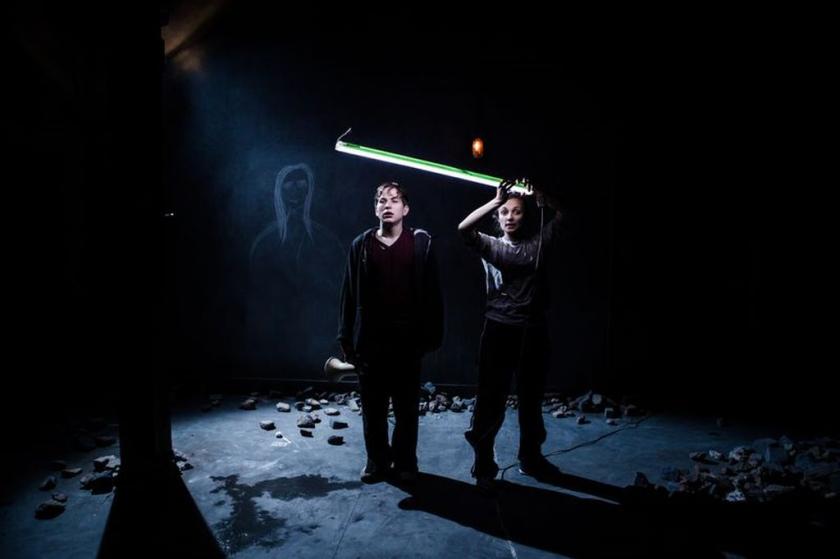"Debris - literally!" Or so spoke a fellow reviewer as she sat down next to me, having navigated her way through the rubble scattered across the floor of Southwark Playhouse's aptly-named Little auditorium. It's here that Openworks Theatre in association with the Look Left Look Right company is reviving Dennis Kelly's 2003 one-act, Debris, which centres on a brother and sister in their late teens as they relive the darkest, most disturbing episodes of their lives.
This early work from the Tony Award-winning writer of the smash musical Matilda (as well as such plays as Osama the Hero and The Ritual Slaughter of Gorge Mastromas) recalls Philip Ridley's intense monologues, and it's goit something of Irish dramatist Enda Walsh in it, as well. And yet, in the capable hands of director Abigail Graham, the play comes with its own icky, instinctive verbosity that is just as beguiling.
 Crucial to Graham's success with Debris is her expert pair of actors. As Michael, Harry McEntire (pictured right) plays a troubled and vulnerable adolescent not that far removed from the grubby loner he gave us in Andrew Sheridan's Winterlong at Soho Theatre in 2011. And it's Michael who opens the play with a stunning speech recalling his father's self-crucifixion, the chubby dad nailed to a 14-foot cross, his 16-year-old son the only witness to the grievous act. As the reminiscence mounts, Michael throws rocks on to an already-hefty pile of broken bricks and stones, clambering to the top of the ever-growing mound of debris, triumphant yet hurting.
Crucial to Graham's success with Debris is her expert pair of actors. As Michael, Harry McEntire (pictured right) plays a troubled and vulnerable adolescent not that far removed from the grubby loner he gave us in Andrew Sheridan's Winterlong at Soho Theatre in 2011. And it's Michael who opens the play with a stunning speech recalling his father's self-crucifixion, the chubby dad nailed to a 14-foot cross, his 16-year-old son the only witness to the grievous act. As the reminiscence mounts, Michael throws rocks on to an already-hefty pile of broken bricks and stones, clambering to the top of the ever-growing mound of debris, triumphant yet hurting.
His sister Michelle, meanwhile, is busy drawing chalk images of their dead mother across the walls and the floor, and by the end of the show, she, too, is in a flushed, drippy state. And as performed with childlike excitement by Leila Mimmack, Michelle delights in the many contradictory versions of her mother's death, all of which would seem to have taken place while her mother was pregnant with her. The question, we come to wonder, is whether this mythologised, self-sacrificing mum would really have protected her children, even had she lived? It doesn't sound likely, and not just because Michael and Michelle aren't the most reliable of narrators, either.
From Michelle we get the ever-protective nature of motherhood, the one we like to think exists against all odds. From Michael we get a separate vision: "pure agony receding into pure love," as he calls it, describing how he feels when he finds a baby in a rubbish heap - his tone shifting from contagious optimism to tragic resignation. Signe Beckmann's design gives the actors a rusty-looking pillar to climb and provides an eerie-looking recess to the back of the stage, which the actors make the most of, scrambling about as if in some sort of horrendously dangerous playground. The visuals only amplify the dark seductions of a revival which, for all its weirdness, ends not by alienating its audience but - against the odds - welcoming them in,















Add comment